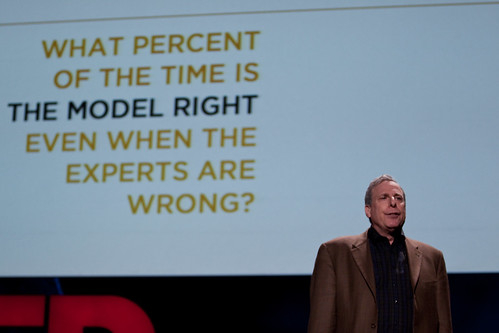BUENO DE MESQUITA–PREDICTIVE GAME THEORY GENIUS OR MATH HERETIC?
Posted on June 16, 2009 by Jeffrey Newman
A 2007 article in Good Magazine written by Michael A.M. Lerner summarized some of the work of Bruce Bueno de Mesquita in mathematically predicting “virtually any international conflict, provided the basic inputs are accurate.” Bueno de Mesquita can also be seen on You Tube giving lectures and his work raise important but thorny issues on the use of math and game theory to determine reliably the outcome of major world events. I repeat earlier caveats that I am neither a math expert or futurist but I have started to examine the potential value of model simulations in charting the potential scenarios that may unfold on the world stage. Allan Stam, Professor of Political Science at Penn State created a study in 2000 to examine the validity of Bueno de Mesquita’s work in The October 2000 British Journal of Political Science. His study tended to support Bueno de Mesquita’s work, within certain limitations. A year before, Stephen Walt on the faculty at Harvard, wrote a work attacking the basic assumptions of Bueno de Mesquita’s approach using “rational choice” models. (rational actions where players are promoting their own interests. Sometimes, says Walt, players will not act rationally).All of this makes it more confounding to see whether the predictions are accurate for the purposes Bueno de Mesquita is asserting–consistent and repeatable findings that can reliably determine the outcome of major international conflicts. From a layman, I ask the following: what I am looking to see from Bueno de Mesquita is NOT JUST that he can achieve good results. What I would like to know is whether OTHER PEOPLE using the same model can achieve the same results using the same methods. As he claims to be using a scientific model, this, it seems to me is a necessary prerequisite . Maybe this has been done already and I stand to be enlightened.
If Bueno de Mesquita has found the secret to solving the Middle East crises, it should be used and he should reap praise for what has not come to pass for a long long time. I probably wouldn’t be so concerned about the potentially negative impact of his work if his claims were not so definitive. For example if Bueno de Mesquita suggested that his work uncovered a range of probable scenarios, I might not be so skeptical, which I am.
Comments (2)


bunch of BS
I was very skeptical, almost to the point of not finishing the article, until I heard his disdain for analysis based on gut instinct, that kind of won me over. While he’s criticized for lack of transparency, analysis based on gut instinct isn’t all that transparent either. I agree, there has been little said about whether his model is usable (with similar results) by people other than him.
The last paragraph particularly caught my attention:
Bueno de Mesquita also approved of Obama’s hands-off approach. Bueno de Mesquita ran an experimental version of his Iranian model without the U.S. in it as a player at all, and the coalitions that oppose Ahmadinejad and the bomb emerge a few months more quickly. In other words, American meddling is indeed counterproductive; the less America tries to influence Iran, the more quickly Iran will abandon nuclear weapons, if the logic of the computer is correct.
Really, there are few methods of analysis that are good at showing how an actor’s actions (the US in this case) that are intended to move a situation towards a particular outcome are actually counterproductive towards that goal. This kind of reminds me of the bias that makes us place more value on evidence that we do have rather than evidence that we don’t (or actions taken over actions not taken, since of course, actions not taken and words not spoken, while perhaps just as relevant as those taken, are hard to see or hear).